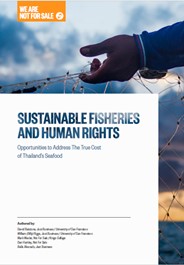Lawyers Manual on Human Trafficking
GuidanceEdited by by Jill Laurie Goodman and Dorchen A. Leidholdt.A guide for legal professionals working with victims of human trafficking.
The fishing industry in Thailand fell under global scrutiny in 2014 for the significant human rights violations at sea. Personal stories of victims who had worked for years at sea with little food and constant physical abuse created enough global attention that governments were forced to enact change. Yet, the fight to protect workers is ongoing, and protections are difficult because of rapidly declining fish populations. While providing aid, resources, and protections to migrants and stateless people are actions necessary to end modern-day slavery at sea, enacting and enforcing sustainable fishing practices is another necessary step in creating safe and sustainable economies for the most vulnerable. This report outlines the importance of healthy commercial fisheries to working conditions in the seafood industry, local and national economics, and food supply. It illustrates the connectivity and internationality between sustainable fishing and human rights, focusing on the connection between overfishing and the safety of workers, particularly on human rights abuses in Thailand. This provides a window into the adverse conditions in many other places where exploitive practices put human beings in jeopardy. It is a call to action for consumers around the world who purchase and enjoy seafood and have a shared responsibility in solving this crisis.

Edited by by Jill Laurie Goodman and Dorchen A. Leidholdt.A guide for legal professionals working with victims of human trafficking.
The data in this report represents signals and cases from January 1, 2019 through December 31, 2019 and is accurate as of July 30, 2020. Cases of trafficking may be ongoing or new information may revealed to the National Hotline over time. Consequen...Read More
From seafood from Thailand and electronics from Malaysia and China, to textiles from India and wood from Brazil, modern slavery exists in all corners of the planet. It is a multibillion-dollar transnational criminal business that affects us all thro...Read More
Leading companies recognize that their global supply chains can be a key asset or a major risk, both in terms of the business value that they represent and their potential impacts on society and the environment. Companies want to gain visibility int...Read More